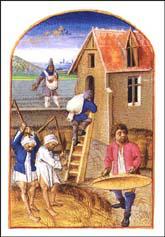Battle of Evesham
After the Battle of Lewes in 1264 Simon de Montfort organised a new parliament. As well as barons and leaders of the church, two representatives from each town were invited to attend parliament. The day-to-day running of the country was carried out by three men: Simon de Montfort, the Earl of Gloucester and the Bishop of Chichester. However, within a few months the barons started to complain that Montfort was acting like a king. Gilbert the Red, his second in command, argued with Simon and left London.
Prince Edward, the king's son, had been imprisoned after the Battle of Lewes but on 26th May 1265 he managed to escape. In June 1265 Gilbert the Red met Prince Edward in Ludlow. The two men raised an army and began their campaign by capturing Gloucester. When Montfort heard about the size of his enemy's army, he is reported to have said: "Let us commend our souls to God, because our bodies are theirs."
A dawn attack at Kenilworth on 2nd August 1265 took forces led by Montfort's son by surprise. The following day Montfort's main army was attacked at Evesham. Prince Edward's army had an easy victory and Montfort's outnumbered army was slaughtered. After Simon de Montfort had been killed, his body was mutilated. His head was cut off and displayed round the country as a warning of what happened to people who rebelled against their king.

Primary Sources
(1) The Song of Lewes (1264)
May the Lord bless Simon de Montfort and also his sons and his army who, exposing themselves to death, fought bravely for the English people... Simon de Montfort had few men used to arms; the royal party was large, having assembled the greatest warriors in England... but God provided... since God is a help for those who are on the side of
justice. Thus it was right that God should help the Earl, for without God he could not overcome the enemy.
(2) Thomas Wykes, Chronicles (c. 1290)
Simon de Montfort... desired to put down the mighty and ruin their power... so that he might more freely and easily subdue the people, after having destroyed the strength of the magnates.
(3) Extract from the song The Lament of Simon de Montfort (c. 1270)
By his death the Earl Montfort gained the victory,
Like the martyr of Canterbury he finished his life;
The good Thomas would not allow holy church to perish,
The Earl fought a similar cause, and died without flinching.
(4) Matthew Paris, English History (c. 1275)
Earl Simon, who gave up not only his property, but also his person, to defend the poor from oppression, and for the maintenance of justice. Report goes, that Simon, after his death, was distinguished by the working of many miracles, which, however, were not made publicly known, for fear of kings.
